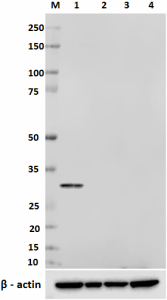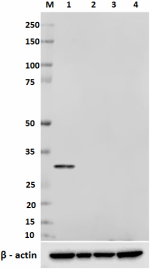- Clone
- P84E4 (See other available formats)
- Regulatory Status
- RUO
- Other Names
- Cyclin-Dependent Kinase 5, Serine/Threonine-Protein Kinase PSSALRE, Tau Protein Kinase II Catalytic Subunit, Cell Division Protein Kinase 5, TPKII Catalytic Subunit, Cyclin-Dependent-Like Kinase 5, CDKN5
- Isotype
- Mouse IgG1, κ
- Ave. Rating
- Submit a Review
- Product Citations
- publications

-

Total cell lysates (15 µg protein) from SH-SY5Y (lane 1), HeLa (lane 2), HepG2 (lane 3) and NIH3T3 (lane 4) cells were resolved by electrophoresis (4-12% Bis-Tris gel), transferred to nitrocellulose, and probed with 0.5 µg/mL (1:1000 dilution) of purified anti-CDK5 antibody (clone P84E4) (upper blot). Proteins were visualized by chemiluminescence detection using a 1:3000 diluted goat anti-mouse-IgG secondary antibody conjugated to HRP for anti-CDK5 antibody or 1:5000 diluted Direct-Blot HRP anti-β-Actin antibody, clone 2F1-1(lower blot). Lane M: Molecular weight ladder.
Cyclin-dependent kinases (CDKs) are a family of Ser/Thr kinases known for their roles in the control of cell cycle progression. CDK5 is an atypical member in that it plays important roles in almost all aspects of brain development and function; it regulates multiple players required for axon formation and regeneration. CDK5 functions as a "plastic" kinase that maintains the axon growth ability by enabling efficient cytoskeletal reorganization, enhancing protein translation, reducing protein degradation, and promoting injury-induced gene transcription. Over-activation of CDK5 is associated with many neurodegenerative disorders such as Alzheimer's and Parkinson's diseases. Furthermore, CDK5 is reportedly involved in T cell activation and plays an important role in development of autoimmune disorders such as multiple sclerosis.
Product DetailsProduct Details
- Verified Reactivity
- Human
- Antibody Type
- Monoclonal
- Host Species
- Mouse
- Immunogen
- Purified recombinant fragment (aa 120-292) of human CDK5 expressed in E.coli.
- Formulation
- Phosphate-buffered solution, pH 7.2, containing 0.09% sodium azide.
- Preparation
- The antibody was purified by affinity chromatography.
- Concentration
- 0.5 mg/ml
- Storage & Handling
- The antibody solution should be stored undiluted between 2°C and 8°C.
- Application
-
WB - Quality tested
- Recommended Usage
-
Each lot of this antibody is quality control tested by Western blotting. For Western blotting, the suggested use of this reagent is 0.5 - 2.0 µg per ml. It is recommended that the reagent be titrated for optimal performance for each application.
- RRID
-
AB_2572168 (BioLegend Cat. No. 684502)
Antigen Details
- Structure
- 292 amino acids with a predicted molecular weight of approximately 33kD.
- Distribution
-
Ubiquitous expression of catalytic subunit in all cells and tissue types, while expression of p35 is restricted mainly to neurons.
- Function
- CDK5 plays important roles in almost all aspects of brain development and function; it regulates multiple players required for axon formation and regeneration.
- Interaction
- CDK5R1 (p25), CDK5R1 (p35), CDK5RAP1, CDK5RAP2, CDK5RAP3, CABLES1, ABL1, CABLES1, CABLES2, AATK, GSTP1, HDAC1, beta-catenin/CTNNB1, delta-catenin/CTNND2, APEX1, P53/TP53, EPHA4, NGEF, EPHA4, PTK2/FAK1, CLOCK and HTR6.
- Ligand/Receptor
- CDK5R1 and CDK5R2.
- Biology Area
- Cell Biology, Cell Cycle/DNA Replication, Cell Motility/Cytoskeleton/Structure, Cell Proliferation and Viability, Immunology, Mitochondrial Function, Neuroscience, Neuroscience Cell Markers, Protein Synthesis, Signal Transduction, Synaptic Biology, Transcription Factors
- Molecular Family
- Postsynaptic proteins, Protein Kinases/Phosphatase
- Antigen References
-
1. Wilkaniec A, et al. 2015. J. Neurochem. 10.1111/jnc.13365.
2. Liu SL, et al. 2015. Mol. Neurobiol.
3. Lai KO, et al. 2015. Mini. Rev. Med. Chem. 15:390.
4. Ye T, et al. 2012. Int. Rev. Neurobiol. 105:91.
5. Cheung ZH, et al. 2012. Trends Cell Biol. 22:169.
6. Lalioti V, et al. 2010. Cell Cycle 9:284.
7. Slevin M, et al. 2009. Curr. Opin. Pharmacol. 9:119.
8. Dhavan R, et al. 2001. Nat. Rev. Mol. Cell. Biol. 2:749.
9. Pareek TK, et al. 2010. J. Exp. Med. 207:2507. - Gene ID
- 1020 View all products for this Gene ID
- UniProt
- View information about CDK5 on UniProt.org
Related Pages & Pathways
Pages
Related FAQs
Other Formats
View All CDK5 Reagents Request Custom Conjugation| Description | Clone | Applications |
|---|---|---|
| Purified anti-CDK5 | P84E4 | WB |
Compare Data Across All Formats
This data display is provided for general comparisons between formats.
Your actual data may vary due to variations in samples, target cells, instruments and their settings, staining conditions, and other factors.
If you need assistance with selecting the best format contact our expert technical support team.
-
Purified anti-CDK5

Total cell lysates (15 µg protein) from SH-SY5Y (lane 1), He...








Follow Us